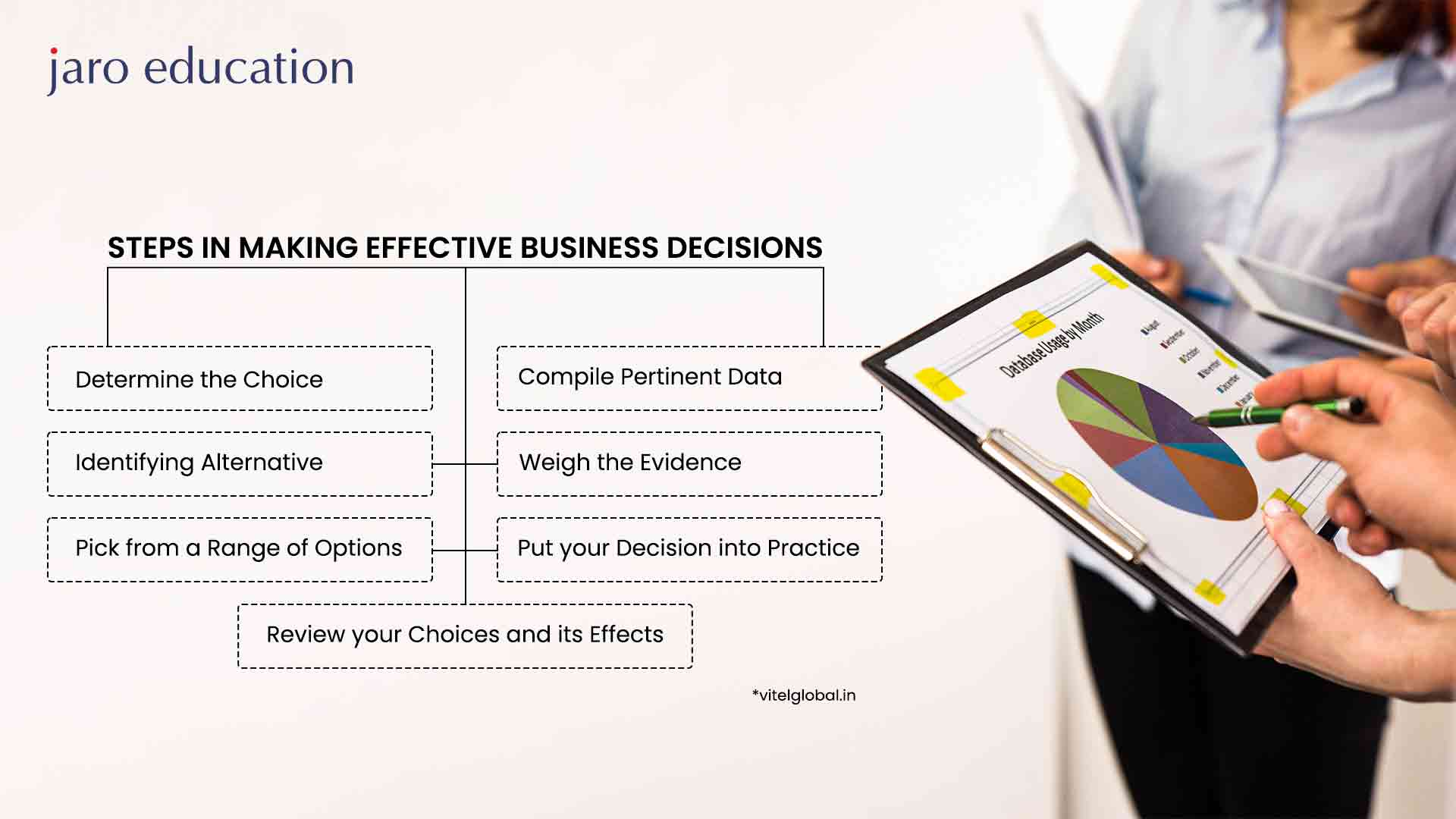The Art Of Decision-Making: A Guide To Effective Business Management
Table of Contents

- jaro education
- 17, January 2024
- 1:00 am
The art of decision-making business management is a crucial skill for effective business management. Regardless of whether one is interested in introducing an item, hiring a new worker, or implementing a new approach, every choice made will affect an organization’s efficiency and prosperity.
Decision-making is not that simple. Such an analysis entails looking at several things, balancing both positive and negative effects, and assessing potential outcomes and hazards. Furthermore, the thinking involved in decision-making is not always sound due to cognitive biases, emotions, or pressure from outside sources. Nevertheless, decision-making involves some complex procedures. It has various problems that make it a difficult process. For instance, there is complexity as it involves so much uncertainty arising from lack of information when making decisions; risk because of fear; and limited time, which does not afford enough deliberation, leading to hasty decisions. These factors influence the quality and efficiency of the judgment, resulting in poor or unreasonable decisions. Besides, decision-making does not happen once, and it is isolated. This ongoing and cyclical process requires close observation, testing, reviewing, and feedback.
Hence, it calls for business managers to gain expertise in making decisions as they run businesses. This entails mastering decision-making processes that are effective or efficient and ethically right within the company’s objectives.
In this blog, we will explore the art of decision-making in business management and provide tips and tools to help you improve your decision-making skills. We will also introduce you to a business management course that can help you learn more about the art of decision-making and other aspects of business management.
What is Decision-Making and Why is it Important for Business Management?
Business management involves making certain decisions concerning the choice of actions out of available alternatives according to certain parameters. Decision-making can be classified into two types: programmed and non-programmed.
- Programmed decisions are often recurrent and standardized according to set procedures. For instance, they determine what resource is assigned where, when to perform the tasks, and which policy should be used. Logical, factual, and analytical decisions are usually programmed and can be automatic or delegated to lower managers and employees.
- Non-programmed decisions are uniquely complicated and demand ingenuity and judgment. They include deciding to introduce a new product into the market, expand geographically, or combine with another firm. Decisions that are not formal are mostly about using the intuitive feeling of an executive director, manager, or leader who needs a lot of time to consider an objective picture.

*vitelglobal.in
The reason why decision-making is important in the business setting is that it influences the success and performance of the company. By making good decisions, business managers can:
- Meet the goals and objectives of the business.
- Utilize resources in a cost-effective manner
- Improve the quality of the products and services.
- Enhance customer satisfaction and retention.
- Increase competitiveness and market share.
- Foster innovation and creativity
- Enhance the morale and motivation among the employees
- Solve internal problems and issues.
- Respond appropriately to environmental changes and opportunities.
What Are The Steps Of Decision-Making?
The decision-making process can vary depending on the type, contextual, and urgent decision. However, a general framework for decision-making can be summarized in the following steps:
Define the problem or opportunity
Outline the problem or target that calls for a solution. Obtain important details or data and set out the desired features of the decision.
Generate alternatives
Identify as many alternative remedies to the problem or opportunities presented. Brainstorm for producing creative solutions but resist judging evaluation until later stages.
Evaluate alternatives
Evaluate the benefits of all these options concerning the set criteria or objectives. Then, apply the quantitative and qualitative approaches like the Cost-benefit analysis, SWOT analysis, or decision matrix and rank and score the options. Scrap those that are inferior or unfeasible. Keep only the best of them.
Choose the best alternative
For each objective, find out which of the alternatives is best; it must achieve maximum benefits in terms of costs and benefits. Evaluate the trade-offs, uncertainties, and risks associated with the decision, and follow your instincts.
Implement the decision
Implement and disseminate the outcome to targeted stakeholders. Develop a plan that includes resource allocation, role identification, schedule with milestones, which provides steps towards implementing the decision. Monitor and manage the implementation process and outcomes to ensure they align with expectations.
Evaluate the decision
Evaluate the effects and assess them against the initial goals and anticipated results. Review the decision, identify feedback, errors, and lessons and apply them in making better decisions.
What Are The Challenges Of Decision-Making?
Decision-making is not a flawless process. The quality of the decision to be made also depends on several factors, which, in turn, may affect the quality of decision outcomes. Some of the common challenges or barriers to decision-making are:
Cognitive biases
These are the heuristics used to make decisions that are fast but may be irrational and incorrect. These include confirmation bias or the tendency to look for evidence that supports what a person already thinks.
Emotions
Feelings or moods might influence how you perceive things, your motivation, and your judgment on decisions. Positive or negative emotions result in favorable and unfavorable impacts of the decision. Positive emotions can boost creativity and intuitive ability while limiting critical thought. On the contrary, negative feelings diminish stress and intensify attention, however, they could be a source of nervousness and terror.
Social pressures
These can be termed as external sources of influence, including issues ranging from culture, values, norms, and ethics to group dynamics. The nature of such social pressures, who creates them, and whether they are useful may differ from one instance to another. The result is that, for instance, social pressure can lead to coordination and agreement but, at times, cause compliance and groupthink.
How To Improve Decision-Making Skills?
Decision-making cannot be learned once and for all – it is a developmental process. Practice, experience, and education can be used to learn, develop, and improve them. Here are some tips and strategies for improving your decision-making skills and making better decisions for your business:
- Ensure that you describe the problem or opportunity objectively without any bias and pre-judgments.
- Acquire accurate and verified details as well as evade information overflow or selective perception.
- Generate as many different ideas/options as possible, and ensure that they are not common.
- Evaluate alternatives systematically and dispassionately, and ignore both cognitive biases.
- Evaluate the alternatives by their expected values or utilities. That is, instead of going with the crowd, go for what you think is best!
- Execute the plan promptly without any delay, postponement, or hesitation.
- Criticize the decision thoroughly, and refrain from defensiveness or complacency.
How To Learn Decision-Making Skills Through A Business Management Course?
A business management course will give you a chance for one of the best ways of learning and improving your decision-making skills through participation. A business management course can help you to:
- Acquire the principles and ideas of making decisions and relate this understanding with corporate situations or illustrations.
- Understand the methods associated with decision-making, like data analysis, problem-solving, critical thinking, creativity, and communication skills.
- Help people develop skills and competencies, including logic, intuition, judgment, and decision-making leadership.
- Become skilled in decision-making processes encompassing business strategy, operations, finance, marketing, and human resources.
In addition, a business management course will educate you on other vital qualities for running a business, including planning, organizing, leading, and coordinating. Additionally, through a business management course, you may increase your chances of advancing your career and realizing professional ambitions like managing, leading, and becoming an entrepreneur or consultant.
Conclusion
The art of decision-making in business management is an aspect of applied science and creativity. It is an important skill that one should possess if looking forward to having the best results or outputs within your company as one of the managers in charge of business management. A business management course will enhance your understanding of decision-making and empower you as a better, more influential leader.
For instance, IMT Ghaziabad’s Executive Program in Business Management aims to equip experienced executives who aim to prepare for senior positions or gain knowledge of modern business management concepts, with the decision-making skill set and many others needed in running a business management. This is an online programme with eleven modules (marketing management, business economics strategy management), including a case-based learning approach.








